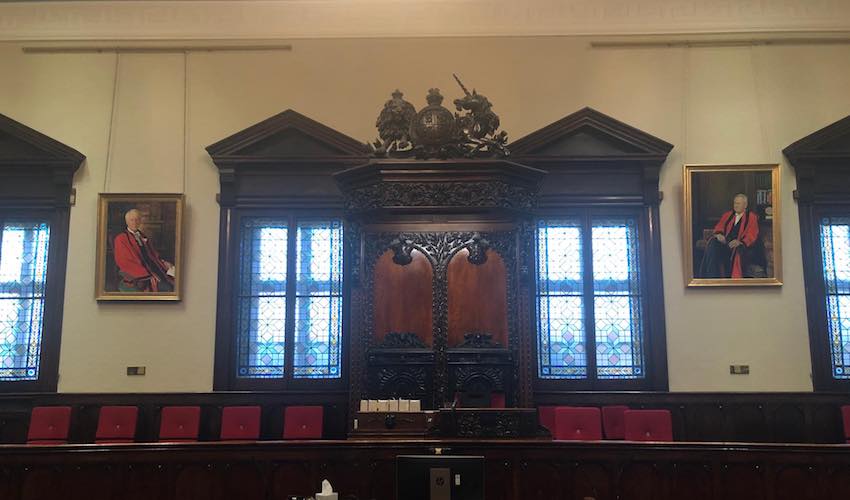

An Italian princess has been given one last chance to pay off a fine worth £2m imposed by Jersey’s Royal Court, or she will face 12 months in prison.
Princess Camilla de Bourbon de Deux Siciles now has until 15 July to pay off the contempt of court fine.
She was handed the fine in December 2020 after refusing to comply with an order to disclose information about assets linked to her mother, Madame Edoarda Crociani, including the location of a $66m Gaugin painting.
The order had been made following a ruling that a $200m trust be reconstituted by Madame Crociani and bank BNP so that Princess Camilla’s sister could once again benefit from it.
$115m was said to have been paid out by BNP, which Madame Crociani had been ordered to indemnify, but only recovered less than £40,000.
Since it was imposed, Princess Camilla has been unsuccessfully arguing against the contempt of court finding and her associated £2m fine, taking her fight against the fine to the Court of Appeal earlier this month.
Her Advocate, Hiren Mistry, presented eight grounds of appeal before Jonathan Crow QC, Lord Anderson of Ipswich QC and David Perry QC.

Pictured: Princess Camilla was handed the fine last year for failing to 'purge' her contempt of court.
The first was that the presiding Commissioner had been improperly involved in her case when he shouldn’t have been, as Jurats are the only ones who should determine facts and sanctions under the law. This, he said, was demonstrated by the fact that the judgment was written in the first person plural, including the words “we” and “our”. The Court of Appeal said there was “nothing in that submission.”
It was also argued that she was denied a “fair hearing before an independent and impartial tribunal” due to one of the Jurats’ previous involvement in her case. The court said it was presented with “no basis on which it could be concluded that [the Jurat] lacked personal impartiality” and that no application had been made to challenge the Jurat’s involvement at the time. “The reality is that no cogent ground for objection existed then or exists now,” the Court of Appeal said.
Other objections were raised about the fairness of proceedings, including an allegation that she had been “doomed to failure even if she was telling the truth” when she was cross-examined. These arguments were not accepted.
The Court of Appeal also rejected a claim that the fine was “unprecedented in its size, disproportionate and based on both immaterial considerations and erroneous findings of fact”. Advocate Mistry also said it was “extraordinary” that her previous legal representative did not mention her “inability to pay a substantial fine”.
“His silence on that score was however not at all extraordinary if – as the Royal Court found – the Appellant was well able to afford it,” the Court of Appeal said.
The Court heard how Princess Camilla had proposed paying off the fine in instalments over five years, having paid four sums of £33,333.33 since missing the original February 2021 payment deadline. The Court of Appeal noted that she faced a “difficulty” in arguing this, as she had not provided any evidence of her wealth and therefore why a lump sum should not be paid.
Princess Camilla said that providing evidence of her financial means could breach her “right not to incriminate herself” and her “right to a fair trial”, but the Court found the argument was “misconceived”.
The Court stated in its judgment: "...If the Appellant’s evidence were to the effect that she cannot raise £2 million, it is hard to see that disclosure of that impecuniosity would encourage or assist BNP in its litigation. She is, in any event, not under any compulsion to make disclosure: it is simply that if she declines to do so for reasons of her own, she cannot hope to substantiate an application for permission to pay the fine by instalments. There is no human right to be accorded preferential payment terms without putting forward the evidence that could justify them.
"For these reasons, we reject the Appellant’s claim that there is sufficient evidence before this Court to make a determination that she is unable to raise £2 million, or to justify an application for payment in instalments."
To her credit, the Court noted the fact that some payments had been made towards the fine – in addition to £10,000 towards BNP’s costs – “establishes at least some willingness, however inadequate, to engage with financial orders of the Jersey courts.”
“Notwithstanding that the Appellant has long been on notice of the requirement to pay the fine in its entirety, and in order to allow for any last-minute logistical arrangements, we are prepared to make a final extension of the time for payment until 15 July 2021. If payment of the full amount due has not been made by the end of that day, the order for imprisonment in default of payment will take effect.”
Weeks later, the Princess then applied for leave to appeal this judgment, which was rejected, and further argued that paying off her fine would stifle her ability to fund an appeal to the Privy Council, which was also rejected. The Court said the “merits of the proposed appeal… do not appear sufficiently strong to support the Apellant’s case for a stay.”
Comments
Comments on this story express the views of the commentator only, not Bailiwick Publishing. We are unable to guarantee the accuracy of any of those comments.